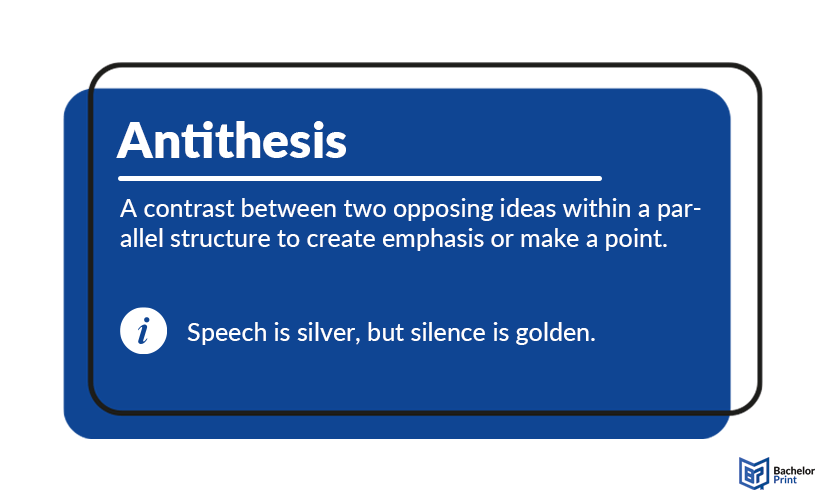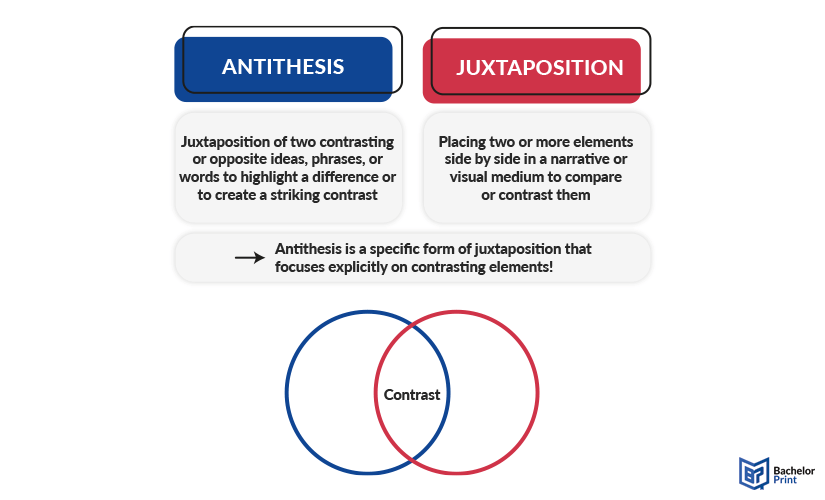
In the world of academic writing, mastering the art of constructing antitheses is like discovering a secret weapon for compelling arguments. Antithesis, a rhetorical device, involves juxtaposing two contrasting ideas close to highlight their differences or to create a striking contrast. Whether you’re crafting academic essays, dissertations, or research papers, integrating this figure of speech can elevate your writing.
Definition: Antithesis
Antithesis is a noun that refers to a literary device where two opposite ideas are juxtaposed in a sentence structure or phrase to highlight their contrast. This technique is used to emphasize the difference between the ideas, typically bringing out a more in-depth meaning or highlighting the complexity of an issue. This creates a memorable impact on the reader or listener. According to Aristotle, the use of an antithesis in rhetoric makes the audience better understand the point the speaker is trying to make. The parallelism of expression serves to emphasize the contradiction of ideas. For instance, in the phrase “It was the best of times, it was the worst of times,” the juxtaposition of “best” and “worst” serves to emphasize the extremes of a situation.
The pronunciation of “antithesis” can be broken down phonetically as /ænˈtɪθ.ə.sɪs/. It has four syllables, with the stress on the second syllable: an-TITH-uh-sis.

Etymology
The etymology of the word “antithesis” comes from the Greek “antitithenai,” meaning “to oppose” or “to set against.” It breaks down into two parts:
- “anti-” – meaning “against”
- “tithenai” – meaning “to place”
The literal meaning and the root word “anti-” capture the essence of antithesis as a figure of speech where contrasting ideas are placed close to each other for emphasis, reflecting the notion of opposition or contrast inherent in its Greek roots.
Synonyms
Synonyms of antithesis and closely related words include:
- Contrast
- Opposition
- Contradiction
- Counterpoint
- Antagonism
- Inversion
- Reverse
- Contraposition
These words share the theme of opposition or contrasting elements being compared or placed together to highlight differences.
Note: Juxtaposition and antithesis are related literary devices, but they are not the same thing. Both involve placing two elements close together for effect, but they serve different purposes and are used in different ways. However, the differences will be explained further below.
Using antithesis in writing
To use antithesis effectively in writing, you have to consider a few points.
- Identify contrasting ideas relevant to your argument or narrative
- Balance your phrasing to make the comparison clear and striking
- Purposeful placement for the most impact
- Keep it clear, so the contrast is understandable and contributes to your argument
- Use in moderation to avoid overcomplicating your text or diluting its effect
Antithesis in academic writing
Antithesis helps to clarify contrasts and contradictions within the subject, making complex arguments more accessible to readers. By presenting opposing viewpoints or theories side by side, it can highlight the strengths and weaknesses of each position, thereby deepening the reader’s understanding of the topic discussed.
Here, the literary device is used to contrast the positive and negative impact of technology on human interaction. This is a well-done implementation of the stylistic device in academic writing.
However, it’s important to use antithesis sparingly and in an appropriate context. Using classic antitheses is inappropriate in academic writing as they lack precision, clarity, evidence, and a formal tone – qualities that are valued in academic writing. Below, you’ll find examples that should be avoided when writing a dissertation.
Examples of antithesis
Antitheses are used across various fields and contexts, ranging from everyday conversations to poetry and political speeches. Below, we provide a series of examples of antithesis in said fields.
Everyday
This emphasizes the importance of saving money for future expenditures, highlighting the contrast between immediate sacrifice and future benefit. It’s commonly used to teach financial responsibility.
Often used in educational contexts, this statement contrasts the accumulation of knowledge with the growing awareness of one’s ignorance, illustrating the endless journey of learning.
Political speeches
This famous antithesis from JFK’s inaugural address contrasts citizens’ demands of their country with their civic duties, inspiring a sense of responsibility and service.
Here, MLK uses antithesis to highlight the contrast between individual actions and their broader social impacts, emphasizing interconnectedness in the struggle for civil rights.
Literature
Dickens opens his novel with this parallel structure to contrast the simultaneous hope and despair of the French Revolution, setting the stage for a story of contrast and conflict.
When talking about antithesis in literature, Orwell employs antithesis to critique the corruption of socialist ideals, contrasting the supposed equality of all animals with the reality of a new hierarchy.
Poetry
Music
The Rolling Stones contrast desires with needs, emphasizing the idea that not getting what we want might actually fulfill our true needs.
This lyric from the Beatles contrasts the act of receiving love with the act of giving it, encapsulating the idea of love’s reciprocal nature in a beautifully simple mathematical equation.
Advertising
Nike’s slogan can be considered a subtle antithesis, juxtaposing the common human experience of hesitation with the decisive act of moving forward and accomplishing goals, regardless of the challenges faced.
Apple’s iconic slogan contrasts the act of thinking with the notion of conformity, encouraging individuality and innovation.
Phrases
This phrase contrasts bravery with reward, suggesting that courage is a prerequisite for deserving beauty or goodness.
Rhetoric
This is a proverb where a double antithesis is placed. “Man” is opposed to “God”, and “proposes” is contrasted with “disposes.”
By placing these opposites together, the phrase highlights the value of silence over speech. The parallel structure of the statement emphasizes the contrast by comparing the worth of speech (silver) to the greater value placed on silence (golden). Here, this literary device serves to make the point that while speaking can be valuable, there are times when not speaking is even more precious.
Antithesis vs. juxtaposition
While antithesis is a form of juxtaposition that explicitly highlights the contrast between opposing elements, juxtaposition itself is broader, including any side-by-side placement for comparison or contrast without necessarily implying opposition. The two concepts do overlap in that antithesis can be considered a specific, contrasting type of juxtaposition.

Antithesis vs. parallelism
Antithesis and parallelism are both rhetorical devices, but they serve different purposes. Antithesis contrasts two opposing ideas to highlight differences or create a striking effect, emphasizing opposition. Parallelism, on the other hand, uses similar syntax in a sequence to create rhythm and balance, emphasizing similarity in form.
While antithesis focuses on contrasting content, parallelism is about the grammatical structure of the expression. They share similarities in enhancing the impact and readability of text. Antithesis often employs parallelism to present its contrasting ideas in a more coherent and impactful manner, demonstrating how these devices can complement each other in strengthening the message.
| Antithesis | Parallelism |
| Juxtaposing two contrasting elements | Does not have to deal in opposites |
Printing Your Thesis With BachelorPrint
- High-quality bindings with customizable embossing
- 3D live preview to check your work before ordering
- Free express delivery
Configure your binding now!
FAQs
Antithesis is a rhetorical device that juxtaposes two contrasting ideas to highlight differences or create a striking contrast.
In poetry, antitheses are used to create tension, emphasize contrasts in themes or emotions, and enhance the expressive power of the poem, typically adding depth to its meaning or highlighting internal conflicts.
A real-life example of antithesis could be the statement regularly heard in decision-making: “I’m torn between following my heart and using my head,” which contrasts emotional decisions with rational ones.
Famous antitheses include:
- “Injustice anywhere is a threat to justice everywhere” — Martin Luther King Jr.’s
- “Ask not what your country can do for you—ask what you can do for your country.” — John F. Kennedy
Antitheses are used in various forms of writing and speech, including literature, speeches, and essays, to emphasize contrast, enhance argumentative impact, and create a memorable, striking effect that engages the audience’s attention and facilitates more profound understanding.
